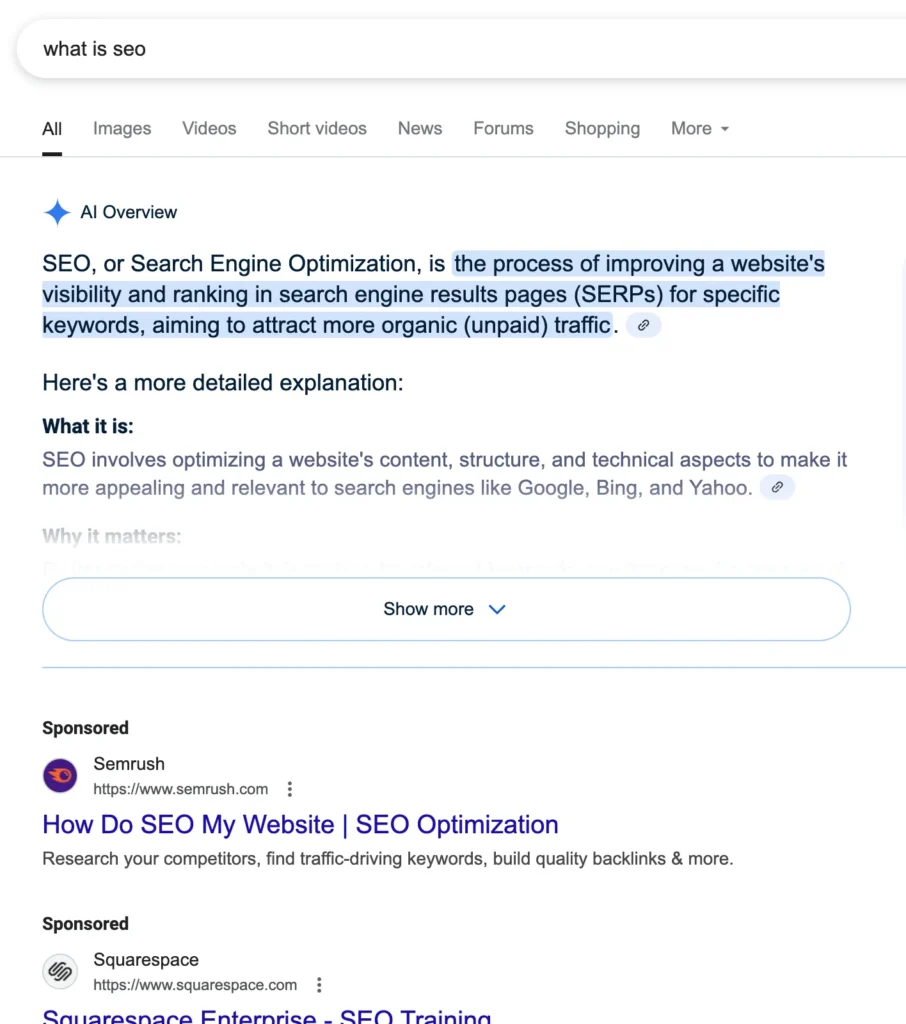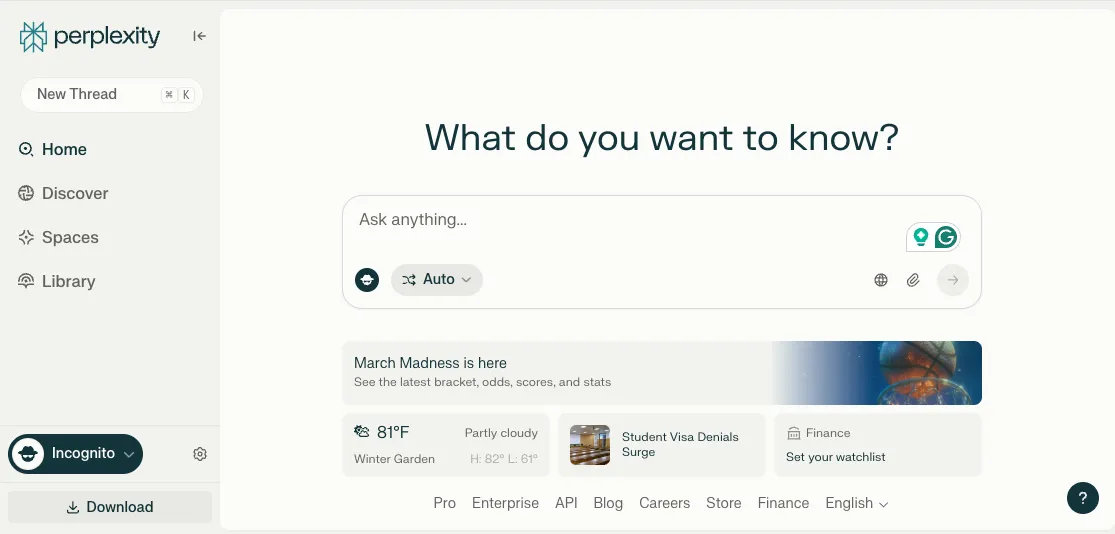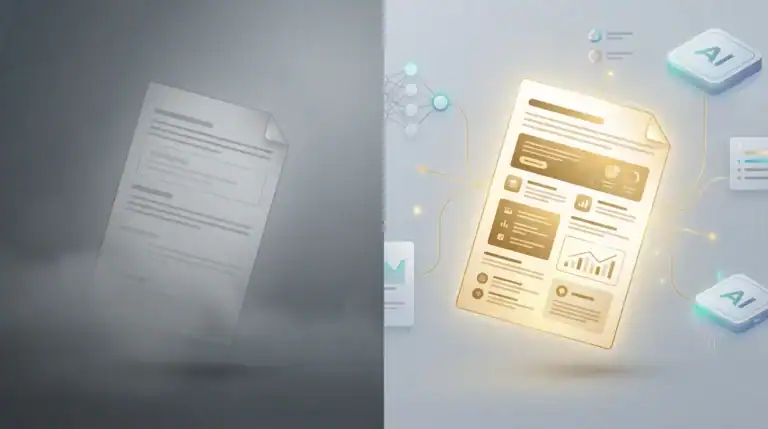Let’s say you’re the marketing director for an established e-commerce brand. For years, your team has mastered the SEO playbook—optimizing metadata, building quality backlinks, and creating keyword-rich content. Traffic has been steady, and conversions have been predictable. Then, suddenly, over the past few months, despite maintaining your ranking positions, you notice organic traffic starting to decline. Your competitors don’t seem to be gaining ground either. What’s happening? You’re witnessing firsthand the dramatic shift in AI and SEO dynamics that are reshaping how consumers discover products online.
Your analytics reveal something curious: users are finding answers without ever clicking through to your site. When you investigate further, you discover your potential customers are increasingly turning to AI tools like ChatGPT and Google’s SGE for product research, comparison, and even purchasing advice—bypassing traditional search results entirely. The rules of digital visibility have fundamentally changed, seemingly overnight.
This scenario is playing out for thousands of businesses right now. The data confirms it: we’re witnessing nothing short of a revolution in how consumers find and interact with online information.
In March 2025, Adobe Analytics released a striking report: traffic to U.S. retail websites from generative AI sources had surged by an astonishing 1,200 percent compared to just seven months earlier. This meteoric rise isn’t just a statistical anomaly—it represents a fundamental shift in how consumers interact with the digital world and signals a new era for AI and SEO.
- 1 The AI Search Revolution Is Already Here
- 2 The Evolution of Search and SEO
- 3 The Numbers Don’t Lie: Changing Search Behavior
- 4 From AI and SEO to GEO: The New Optimization Frontier
- 5 How AI Is Changing User Engagement
- 6 The Death of SEO? Not So Fast
- 7 The Human Element Remains Critical
- 8 Looking Ahead: What’s Next for SEO and AI?
- 9 Adapting to the New Reality
- 10 Your Path Forward in the AI-SEO Landscape
The AI Search Revolution Is Already Here
Google Search has dominated the internet for over 20 years, processing nearly 200,000 queries per second and accounting for two-thirds of all web traffic referrals. As Alphabet’s core business, Search generated $198 billion in 2024—almost 60% of the company’s annual revenue.
The Adobe report, based on an analysis of more than one trillion visits to U.S. retail sites, paints a clear picture of changing consumer behavior. Between November 2024 and December 2024, traffic from generative AI sources to retail sites increased by 1,300 percent compared to the previous year. By February 2025, this growth had sustained at 1,200 percent compared to July 2024.
What’s particularly revealing is how consumers use these AI tools. According to Adobe’s survey of 5,000 U.S. consumers, 39 percent have used generative AI for online shopping, with common tasks including research (55 percent), product recommendations (47 percent), and deal-hunting (43 percent).
This shift extends beyond retail. In February 2025, traffic to U.S. travel and hospitality sites from generative AI sources increased by 1,700 percent compared to July 2024, while banking sites saw a 1,200 percent increase over the same period.
The Evolution of Search and SEO
To understand the evolving relationship between AI and SEO, we must first recognize how search itself has evolved. Traditional search engines like Google have progressively integrated AI into their algorithms for years, from RankBrain in 2015 to BERT in 2019, MUM in 2021, and the Helpful Content Updates from 2022 to 2024.
Scott Keever, a Forbes Councils Member and SEO expert, notes in Forbes that “AI-powered algorithms…have significantly impacted SEO by enhancing search result accuracy and personalization… Search has progressed from basic keyword matching to semantic search, taking into account user behavior and the meaning behind words or phrases.”
The most dramatic shift, however, came with the introduction of large language models (LLMs) like ChatGPT and Google’s continued evolution toward what’s being called “AI-first search” with its Search Generative Experience (SGE).
The Numbers Don’t Lie: Changing Search Behavior
According to data from Exploding Topics, October 2024 marked the first time Google’s market share dropped below 90% since March 2015—and this doesn’t even account for searches conducted via chatbots like ChatGPT, Claude AI, and Perplexity.
This shift in user behavior has real implications for the future of AI and SEO. A recent Gartner report predicts that traditional search engine volume will drop by 25% by 2026 due to AI chatbots and other virtual agents.
Why are users turning to these alternatives? They offer conversational interactions, direct answers without the need to browse multiple pages, and multitasking capabilities that traditional search engines lack.

From AI and SEO to GEO: The New Optimization Frontier
As the convergence of AI and SEO deepens, a new approach to optimization is emerging: Generative Engine Optimization (GEO).
According to a research paper titled “GEO: Generative Engine Optimization,” this approach combines traditional SEO with an understanding of how generative AI models process and prioritize content.
“Recent success of large language models (LLMs) has paved the way for better systems like BingChat, Google’s SGE, and perplexity.ai that combine the strength of conventional search engines with the flexibility of generative models. We dub these new age systems generative engines (GE) because they not only search for information but also generate multi-modal responses by synthesizing multiple sources,” the authors note.
They further concluded, “including citations, quotations from relevant sources, and statistics can significantly boost source visibility, with an increase of over 40% across various queries.”
In practical terms, this means optimizing content not just for traditional search rankings but for how it will be interpreted and presented by AI systems that generate conversational responses.
How AI Is Changing User Engagement
Perhaps the most significant finding from Adobe’s report is how AI-referred visitors behave differently:
- Visitors from generative AI sources show 8 percent higher engagement, lingering on retail sites longer
- They browse 12 percent more pages per visit
- They have a 23 percent lower bounce rate compared to visitors from traditional sources
- For travel sites, the bounce rate is 45 percent lower for AI-referred visitors
These metrics suggest that AI tools are effectively qualifying traffic, sending more engaged and informed visitors to websites.
However, there’s a potential downside: when it comes to conversion (visits becoming purchases), traffic from generative AI sources is 9 percent less likely to convert compared to other traffic sources. This gap is narrowing, though—in July 2024, it was 43 percent.
The Death of SEO? Not So Fast
Despite alarmist headlines claiming “the death of SEO,” the reality is more nuanced. As Opace, a Birmingham SEO agency notes, “According to Ahrefs, SEO has died 4,852 times since January 2016“—and that was before ChatGPT even existed.
Rather than disappearing, SEO is evolving alongside AI. The core principles—creating valuable content that meets user needs—remain crucial, but the techniques and metrics are changing.
Key trends that will shape SEO in 2025-2026 include:
- AI Overviews dominating the SERP: Google’s AI-generated responses now appear in approximately 15% of searches and will continue to grow. Early data suggests these can lead to an 18-64% decrease in organic clicks for affected queries.
- The rise of user-generated content: Platforms like Reddit and Quora have seen explosive traffic growth (603% and 379% respectively since June 2023) as users seek authentic human experiences amid the rise of AI-generated content.
- AI tools becoming integrated into SEO workflows: 86% of SEO professionals now use AI tools, reporting improved performance and time savings (12.5 hours per week on average).
- E-E-A-T and brand signals growing in importance: As AI-generated content proliferates, search engines are placing greater emphasis on Experience, Expertise, Authoritativeness, and Trustworthiness.
The Human Element Remains Critical
Even with the rise of AI, human expertise continues to play a vital role in effective SEO. As Keever points out in Forbes, “While using AI to generate content is fast and cost-efficient, human-driven content brings creativity, emotions, and unique perspectives that AI cannot emulate.”
The most successful approach appears to be a balanced one, where AI tools augment human creativity rather than replace it. This hybrid approach enables marketers to leverage AI’s data processing capabilities while maintaining the authenticity and creativity that only humans can provide.
Looking Ahead: What’s Next for SEO and AI?
As we look toward the future, several key developments seem likely:
- Better integration between traditional search and AI experiences: Google is already moving in this direction with SGE, and we can expect this integration to become more seamless.
- More sophisticated AI tools for content creators: As AI models improve, the tools available to SEO professionals and content creators will become more powerful and easier to use.
- Increased focus on unique, authoritative content: As AI-generated content becomes more prevalent, the value of truly original, expert content will only increase.
- New metrics for success: Traditional SEO metrics like ranking positions may become less relevant as AI-generated responses gain prominence. New metrics focused on inclusion in AI results and user engagement will emerge.
Adapting to the New Reality
The data from Adobe, coupled with insights from SEO experts and industry research, paints a clear picture: AI is fundamentally changing how users search for and interact with information online. For businesses and marketers, this isn’t just a challenge—it’s an opportunity to reach users in new, more engaging ways.
The future of AI and SEO will reward those who adapt quickly, embracing new technologies while maintaining a focus on creating valuable, authentic content that truly serves user needs. The key will be finding the right balance between leveraging AI tools and preserving the human creativity and expertise that continues to set great content apart.
As we navigate this transition, one thing is certain: SEO isn’t dying—it’s evolving into something more sophisticated, more integrated with AI, and potentially more valuable than ever.
Your Path Forward in the AI-SEO Landscape
Returning to our opening scenario, you might be wondering what concrete steps you can take to thrive in this new environment. Through experimentation in real-world scenarios, we’ve developed a framework that helps businesses transition from traditional SEO to a comprehensive AI visibility strategy. Our approach includes:
- A comprehensive audit of your current content’s performance in both traditional search and AI-generated responses
- Strategic adaptation of your content structure to maximize visibility across all search platforms
- Implementation of GEO techniques that position your brand as an authoritative source for AI systems
- Development of metrics and tracking systems specifically designed for the new AI search landscape
Every business situation is unique, with different competitive landscapes, content assets, and strategic goals. If you’re facing challenges similar to those described in this article and would like a personalized assessment of how your digital presence can be optimized for the AI-search revolution, we’d be happy to share more specific insights tailored to your situation.
Many of our clients have seen dramatic improvements in their visibility across both traditional and AI search channels after implementing these strategies. We’re passionate about helping businesses not just survive but thrive amid these technological shifts.
Sources:
Aggarwal, Pranjal, et al. “GEO: Generative Engine Optimization.” arXiv, 16 Nov. 2023, arxiv.org/abs/2311.09735.
“Google’s AI Search Overhaul: Racing ChatGPT for the Web’s Future.” Bloomberg, 24 Mar. 2025, www.bloomberg.com/news/features/2025-03-24/google-s-ai-search-overhaul-racing-chatgpt-for-the-web-s-future.
“Adobe Analytics: Traffic to U.S. Retail Websites from Generative AI Sources Jumps 1,200 Percent.” Adobe Blog, 17 Mar. 2025, blog.adobe.com/en/publish/2025/03/17/adobe-analytics-traffic-to-us-retail-websites-from-generative-ai-sources-jumps-1200-percent.
Engel, Keri. “Future of SEO: 5 Key SEO Trends (2025 & 2026).” Exploding Topics, 7 Mar. 2025, explodingtopics.com/blog/future-of-seo.
“Gartner Predicts Search Engine Volume Will Drop 25% by 2026 Due to AI Chatbots and Other Virtual Agents.” Gartner, 19 Feb. 2024, www.gartner.com/en/newsroom/press-releases/2024-02-19-gartner-predicts-search-engine-volume-will-drop-25-percent-by-2026-due-to-ai-chatbots-and-other-virtual-agents.
Keever, Scott. “AI Is Driving The Future Of SEO: How To Adapt.” Forbes, 2 Feb. 2024, www.forbes.com/councils/forbesagencycouncil/2024/02/02/ai-is-driving-the-future-of-seo-how-to-adapt/.
Schwartz, Barry. “What is generative engine optimization (GEO)?” Search Engine Land, 29 July 2024, searchengineland.com/what-is-generative-engine-optimization-geo-444418.
“The Death of SEO? How AI is Shaping The Future of SEO.” Opace Agency, 14 Mar. 2025, opace.agency/blog/death-of-seo-ai-future-of-seo.

